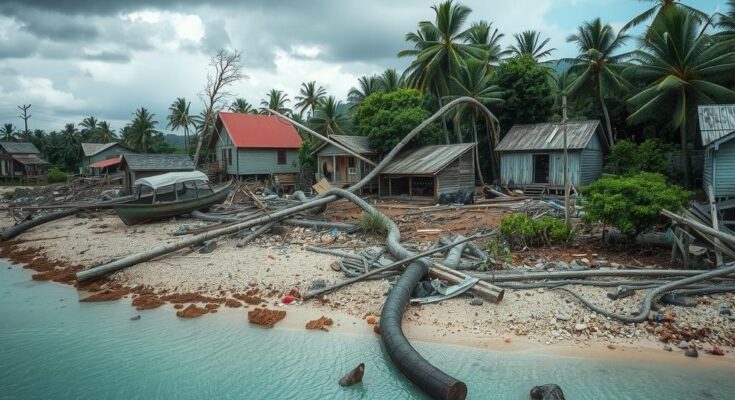Cyclone Chido has killed at least 11 people and injured 246 in Mayotte, causing catastrophic damage. The cyclone, recorded as one of the worst in 90 years, has left critical infrastructure heavily affected. With the storm moving towards Mozambique, preparedness measures are being implemented in neighboring countries.
Cyclone Chido has resulted in the tragic loss of at least 11 lives and caused extensive destruction in the French territory of Mayotte, located in the Indian Ocean, according to statements made by France’s Interior Ministry on Sunday. The storm, which passed through the southeastern Indian Ocean, has left nine individuals in critical condition and has injured a total of 246 people. Officials noted that they are struggling to ascertain the full extent of casualties, with rising concerns that the toll may further escalate.
The cyclone impacted several surrounding islands, including Comoros and Madagascar, but Mayotte bore the brunt of the storm, suffering significant devastation on Saturday. The prefect of Mayotte remarked that this cyclone was the most severe to strike the island in the last 90 years. French Interior Minister Bruno Retailleau expressed grave concern following an emergency meeting, indicating that the death toll in Mayotte “will be high.”
Chido reached wind speeds exceeding 220 kph, according to data from the French weather service, resulting in the destruction of roofs and various small structures throughout Mayotte, which has a population of more than 300,000 residents. Multiple neighborhoods were reportedly leveled, with widespread reports of uprooted trees and boats that had been overturned or sunk. In addition, the main airport sustained significant structural damage, according to the French transport minister. Mayotte, known as France’s least affluent island, has previously faced challenges such as drought and inadequate infrastructure investment.
The cyclone has since moved towards Mozambique, with emergency officials predicting that 2.5 million people could potentially be affected in two northern provinces. Furthermore, neighboring landlocked nations, Malawi and Zimbabwe, have taken precautionary measures as they prepare for possible evacuations from low-lying regions due to imminent flooding risks. It is noteworthy that the area has experienced a succession of potent cyclones in recent years, including the catastrophic Cyclone Idai in 2019, which claimed over 1,500 lives across Mozambique, Malawi, and Zimbabwe.
Cyclone Chido poses a grave threat to the Indian Ocean region, particularly affecting territories such as Mayotte. This region has faced a series of powerful cyclonic occurrences in recent years, highlighting the vulnerability of nations situated in the path of tropical storms. Mayotte, in particular, has been struggling with socioeconomic issues, which exacerbates the challenges faced during natural disasters. The potential for increased climate-related events necessitates a focused examination of preparedness and response strategies by authorities.
In summary, Cyclone Chido has wreaked havoc in Mayotte, leading to fatalities and widespread destruction. With ongoing assessments of the damage and injuries, there is an urgent plea for resources and assistance. The cyclone’s progression towards Mozambique raises additional concerns regarding its impact on surrounding nations. The incident underscores the need for improved disaster preparedness and resilience in the region.
Original Source: www.business-standard.com




